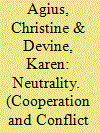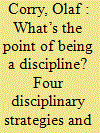|
|
|
Sort Order |
|
|
|
Items / Page
|
|
|
|
|
|
|
| Srl | Item |
| 1 |
ID:
107614


|
|
|
|
|
| Publication |
2011.
|
| Summary/Abstract |
This article approaches 'neutrality' as an essentially contested concept and traces its meaning and purpose over centuries-long historical timelines and situated political, societal and security contexts. It distinguishes neutrality from other concepts such as 'neutralization' 'non-belligerency', 'non-alignment', 'military non-alignment', 'military neutrality' and 'non-allied'. The article explains the politics of defining neutrality in the current European political and legal landscape and in the context of shifting definitions and practices of war, peace, security and state sovereignty. This episteme-based analysis focuses on changes to neutrality in accordance with the rise and fall of particular empires and international actors over time, and changes to its status linked to the development and reification of particular meta-theoretically-based subfields of International Relations and Political Science, setting the background to this special issue of Cooperation and Conflict. A renewed emphasis on the normative aspects of neutrality (i.e. the role of domestic values, politics, preferences, history and mass publics in foreign policy formulation) is achieved by employing a range of perspectives, characterized by increased pluralism in levels of analysis and theoretical approaches. Through this pluralism, authors engage with (1) the strategic and normative drivers underpinning the norm of neutrality, (2) the potential for neutrals to serve as norm entrepreneurs in the field of peace promotion, (3) the tenuous legal status of elites' quasi-neutral foreign policy constructions underpinned by tensions between discourses and practices and (4) the discursive strategies underpinning the move from neutral states' traditional forms of neutrality to what is termed 'post-neutrality' in the current politico-legal context.
|
|
|
|
|
|
|
|
|
|
|
|
|
|
|
|
| 2 |
ID:
188697


|
|
|
|
|
| Summary/Abstract |
While disciplinary identities are among the most fraught subjects in academia, much less attention has been given to what disciplinarity actually entails and what risks different disciplinary strategies involve. This article sets out a theory of disciplinarity that recognises not only their coercive but also their redeeming features, particularly in view of the coexistence of multiple competing disciplines and powerful transdisciplinary movements (such as rationalism). On this basis it identifies four disciplinary strategies and each is assessed in relation to the future of IR: (1) remaining a subdiscipline of Political Science (‘stay put’), (2) becoming an interdisciplinary field (‘reach out’), (3) dissolving into transdisciplinarity or abolishing IR (‘burn down’), or (4) establishing IR as a discipline in its own right (‘break out’). Rejecting the false choice of disciplinary constraint versus epistemic freedom, this framework allows IR and other subfields to more consciously consider a range of disciplinary strategies and to entertain the risks and affordances they each offer. The article concludes that a future independent discipline focused on the implications of ‘the international’ not just for politics but all fields – including disciplinarity – would make for a broader, more diverse IR, ultimately also better able to engage other disciplines.
|
|
|
|
|
|
|
|
|
|
|
|
|
|
|
|
|
|
|
|
|